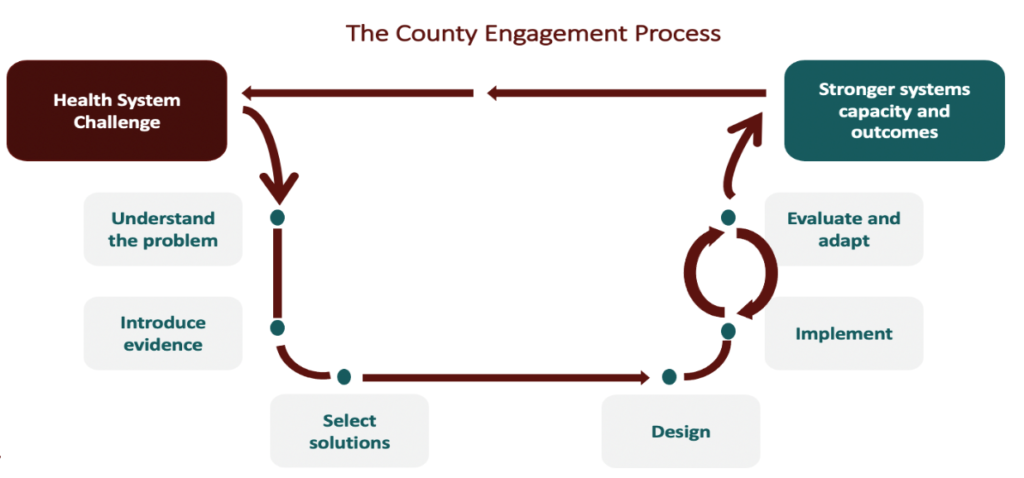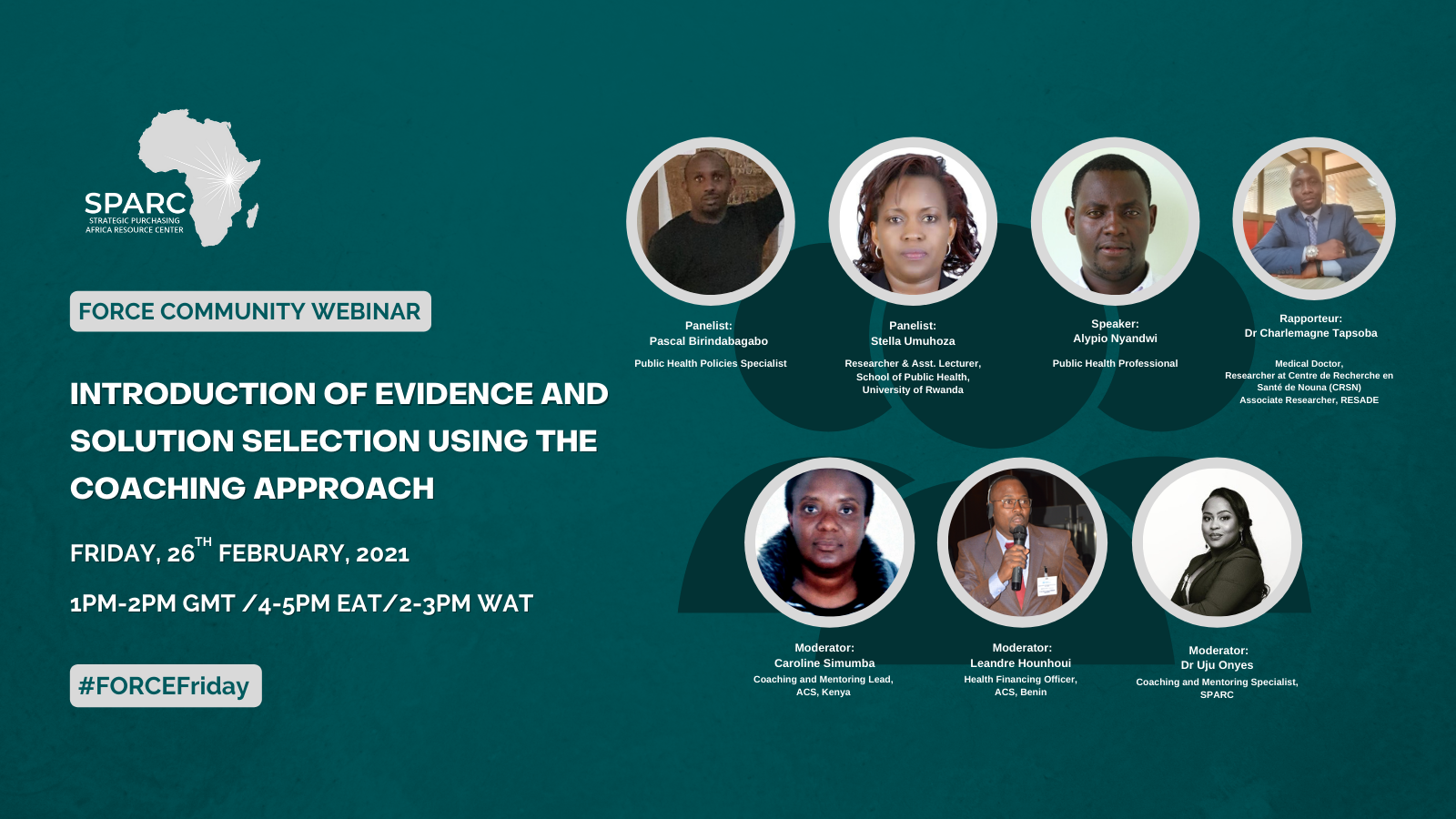Background
The Strategic Purchasing Africa Resource Center (SPARC) is a resource hub aimed at strengthening strategic purchasing capacity in sub-Saharan Africa (SSA). Our vision is to empower countries with knowledge and practical tools to make access to affordable and quality health care a reality for all. SPARC is not just a resource centre. It is a movement. SPARC engages individuals from stakeholder groups across sub-Saharan Africa to understand, talk about and advocate for strategic purchasing as a way to make better use of limited resources for UHC and to hold decision-makers accountable for effective health spending. We also work with partners to change the provision of technical assistance – tapping to and deepening regional expertise and building a Coaching Approach (CA) that emphasizes learning by doing.

Most country processes exist in the form above or some variation of that. The SPARC coach keys into this process or supports the development of different steps in the process to support country processes with the aim of building capacity on skills needed for country reform to allow stakeholders to undertake the process in the future after Technical Assistance (TA) ends.
In 2018, SPARC went on a scoping mission to Rwanda and held several meetings with key stakeholders involved in Strategic Health Purchasing (SHP), including the Rwanda Social Security Board (RSSB), the School of Public Health (SPH), the Ministry of Health (MOH) and development partners to fully understand the health financing landscape. At the end of the visit, the stakeholders identified the need for capacity development of stakeholders on SHP as a critical need. The visit led to the signing of a Memorandum of Understanding (MOU) between MOH, SPH and SPARC. Following the MOU execution, SPARC, alongside its technical partner SPH, and MOH, convened a workshop to align on critical work areas to operationalize the MOU.
Summary of the FORCE Webinar session
The February FORCE Webinar focused on the country engagement process’s second and third steps – introducing evidence and selecting solutions. The discussions were based on SPARC’s country engagement experience in Rwanda and centred on how coaches can play a crucial role in enhancing efficiency, effectiveness, and equity by deploying specific skills during facilitation processes. It focused on how SPARC’s coach supported Rwanda country partners to use evidence to reflect on their challenges. This support led to the development of a Theory of Change (TOC) and the identification of priority activities for implementation to reform SHP in Rwanda.
The objectives of the one-hour session were:
- To highlight the specific technical and soft skills required to facilitate a multi-stakeholder process in selecting health financing solutions.
- To discuss, based on experiences from Rwanda, how the coach can create an environment where the needs of all stakeholders are taken into account.
- The importance of neutrality, inclusiveness and respect for the outcomes of the process.
Key Takeaways from Rwanda
- SPARC engaged Pascal Birindabagabo, a HSS expert with practical experience in Rwanda, to support the process using his technical knowledge and strong relationships with key stakeholders to facilitate transparent dialogue.
- The coach had a good understanding of the country’s underlying political, economic, and institutional landscape and used this to guide the country team to see where the real problems lie and the factors that contribute to them.
- Following the MOU signing, it was realized that a core implementing SHP partner, the RSSB, had not been included in the MOU. Steps were taken to remedy this by the MOH who engaged with the RSSB and invited them to join the process.
- All key stakeholders agreed to participate in a workshop to align on the problems and agree on priority activities to remedy the challenges.
- A core team of representatives from the MOH, SPH, RSSB, and the coach worked together to plan the workshop.
- The core team co-developed the workshop agenda, delivery approaches and content through a consultative and collaborative process that ensured that all stakeholders were involved in planning the workshop and were equally engaged.
- Policymakers and implementers are very busy people. Therefore, the workshop (which was held at a location outside Kigali) presented an opportunity to bring all key stakeholders together to further understand and define the problem.
- The workshop presented a unique opportunity for all key government SHP stakeholders in Rwanda to be in the same room to discuss and agree on the issues affecting SHP and align on the way forward.
- Evidence from a situational analysis and desk review of Rwanda’s SHP landscape was presented in a respectful and context-appropriate manner during the workshop.
- The evidence was developed by SPH, local experts familiar with the Rwanda context and stakeholders. SPH and the coach introduced the evidence in a respectful manner and were mindful not to alienate any stakeholders involved in the process.
- Using evidence from countries such as Kenya, Ghana and Malaysia, SPARC facilitated a cross country learning session during the workshop, which aimed to build the workshop participants’ capacity on institutional arrangements and operational systems needed to make purchasing health services more strategic.
- To mitigate conflicts of interest between different stakeholders, the core group and the coach’s facilitation skills were useful in creating an environment of trust with stakeholders, which allowed them to express themselves fully.
- To outline the pathway to achieving progress, the workshop participants developed a Rwanda TOC to articulate the problems affecting SHP and outline a clear pathway to progress and attainment of UHC in Rwanda.
- SPARC shared a Partnership Accountability Framework (PAF) template to participating institutions for preliminary documentation of objectives and proposed activities for prioritization for a joint work plan.
- Supported by the coach, the various institutions worked to finalize the PAF template during and after the workshop. The activities in the PAFs were then consolidated into a joint PAF and shared with all the participants.
- All stakeholders were effectively engaged throughout the process by the coach to ensure their buy-in and support of the process.
- The coach conducted the planning, facilitation and development of the workshop outputs in a collaborative manner that involved all stakeholders in the process. Thereby ensuring that all partners were in alignment and had a shared commitment to the agreed goals.
Key skills deployed by the SPARC coach in Rwanda to facilitate the process include:
- Technical knowledge, skills, and experience in health system strengthening
- Knowledge and experience of country context with the ability to explain how the health sector, country partner’s organization/institution is structured
- Knowledge and skills in leadership and management
- Ability to learn from others
- Respect all stakeholders
- Confidence and humility
- Patience and emotional intelligence to facilitate the process
- Effective communication
- Ability to support the vision, mission and goals of the country teams
- Commitment to the coaching and mentoring process.
- Active listening
- Positive reinforce and encourage.
- Ability to share lessons learnt from their own implementation experiences
- An excellent technical resource and sounding board for all stakeholders.
To learn more about the coaching approach, please take the online module here. Join us for our next webinar in March as we discuss the next steps on the country engagement framework, design and implementation of the solution.

